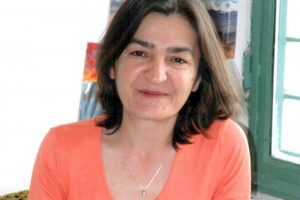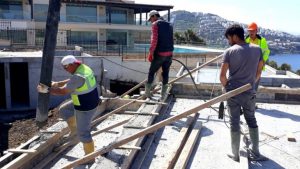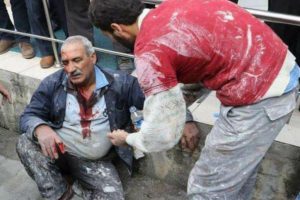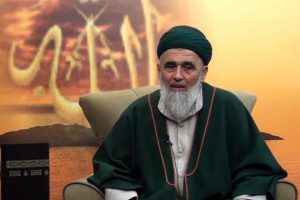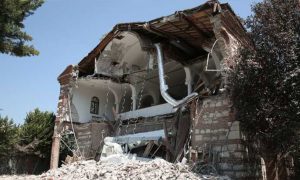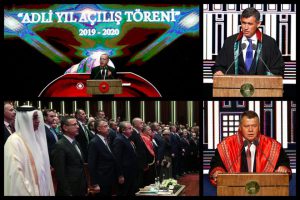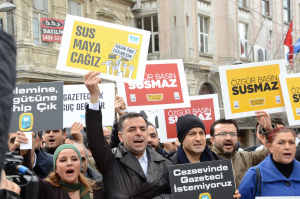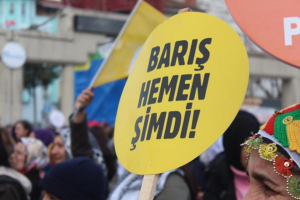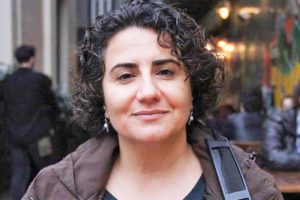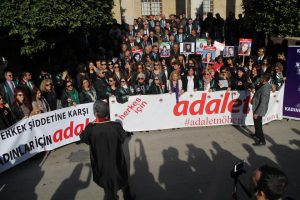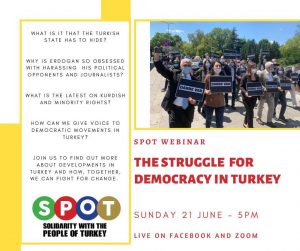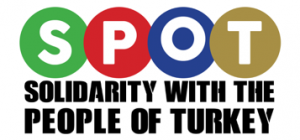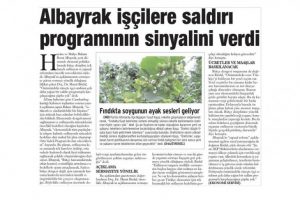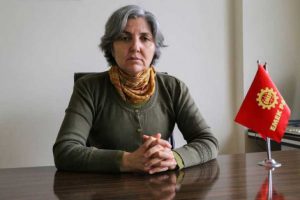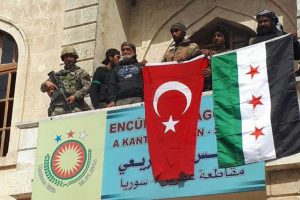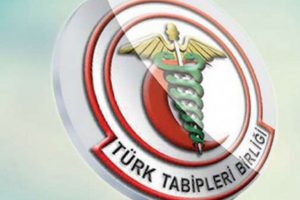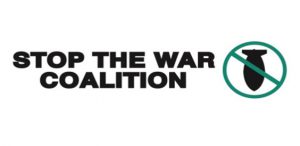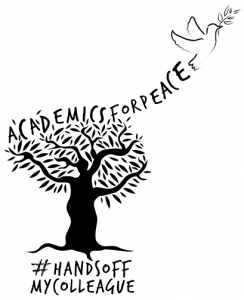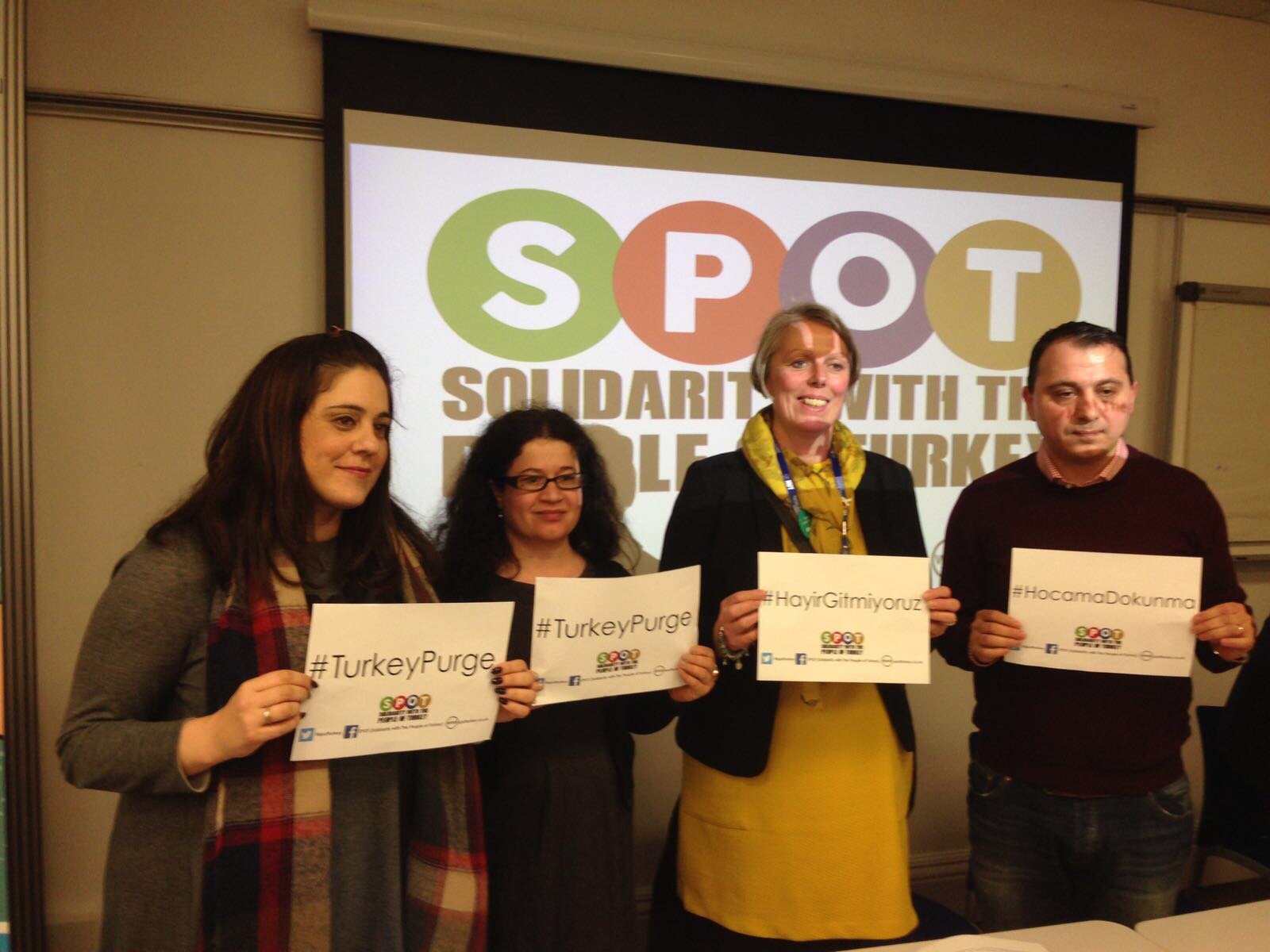The main opposition CHP party, subject of great speculation for months especially as to who its provincial and sub-provincial mayoral candidates are to be and whether it will broker an alliance and, if so, how the cities will be shared out, came back onto the country’s agenda with the events at last week’s Party Assembly (PA) meeting at which the candidates for critical provinces and sub-provinces were nominated.
First the resignation of Istanbul Provincial Chair Canan Kaftancıoğlu and then the withdrawal of her resignation a few hours later, the mass resignation of certain sub-provincial organizations, the objections mutating into activism of those mayors who were not renominated as candidates, and the mutual accusations flying back and forth on social media… The spectacle that the CHP management described as being “in-party democracy” came as grist to the mill of the ruling block’s propaganda of “a party that is incapable of managing itself”. The thinking and criticism took firmer root that the main opposition party is incapable of manufacturing policies and by and large positions itself within the political confines of the new regime.
A further development to attract the scrutiny of columnists and analysts was the response, conveyed in worried tones, of the CHP, which is continuing in the 31 March local elections with the policy of opening to the right that has been underway since Deniz Baykal, “It has nothing to do with us” to the HDP’s decision not to field candidates in the three large cities.
Today’s PA meeting will reveal where the discussion ends up and whether the nomination of the remaining candidates will lead to further tension and resignations.
I spoke to Cumhuriyet newspaper columnist and political scientist Associate Professor Dr. Deniz Yıldırım about “CHP’s crisis” that has been firmly on the political agenda for the whole week.
Let us start with your take on the events in the aftermath of the PA meeting at which the CHP’s critical provincial and sub-provincial mayoral candidates were nominated. What is the basic problem that is bringing the in-party struggle for power within the CHP back to the surface?
It is actually inevitable that this would happen. We see a multitude of prospective candidates applying in places where there is a high chance of winning and a dearth of candidates in places where the chance of victory against the AKP-MHP is low. Municipalities are the places where the CHP ranks get their strongest taste of power while in opposition. That is, the CHP, without being in power at the national level, holds some very critical sub-provinces in its hands especially in the metropolitan cities in terms of exploiting its political resources, its human, social and cultural resources. As such, a massive quarrel over the share-out is going on in these places. The CHP gives the appearance of a party that has succumbed far more to a quarrel over the internal sharing of power absent the ability for a broad, encompassing political line to be charted. What is provoking the greatest debate is that the places producing an abundance of prospective candidates being at the same time places where victory is guaranteed is indicative of a quarrel that goes beyond expanding the party.
Such a crisis could have been made less turbulent by dealing with the nomination of candidates at an earlier stage rather than close to the election. However, party management appears to have drawn this out to an extent to watch and observe the ruling block’s candidates and to an extent because it feared its own candidates being mauled. The upshot is that it is not discussion of the ruling party’s incorrect policies but the CHP’s internal crisis that is filling the agenda shortly before the election.
Is there any way CHP management could not have seen this? If the outbreak of a quarrel over power sharing was inevitable, why couldn’t it have been prevented?
For one thing, there is no overall political “cause” uniting the party. In the absence of an overall cause or a political passion and goal, we see, for instance, a reluctance for high-rankers in the party to go and stand in places that might be lost. This means there is a dearth in the ranks of those who say, “Let me make a sacrifice to boost my party and at the same time for my party to bring the power holders down a peg or two.” Everyone is trying to manoeuvre in a winnable space. I mean, this is not just a problem to do with CHP management. The second point is that it cannot be prevented because there are groups within the party. It is the old story of “that lot’s guy, this lot’s guy.” “Whose candidate is to be mayor in critical sub-provinces in the metropolises? If we give such-and-such a group so many municipalities the quarrel with them won’t get too big and we’ll maintain our power at the congress after the election thanks to the delegates these municipalities have.” So, we can think of the calculations being somewhat tied in with this. And, hence, a whole host of arguments are going on; the resignations turn out to be mayors who say, “We don’t recognize headquarters’ decision.”
CHP management accounts for what is going on saying, “We have internal party democracy – that’s why it’s happening.”
The candidate nomination process itself is not democratic in Turkey. There are internal polls in a limited number of places. However, in essence certain figures are brought before the Central Executive Committee and then go to the PA. So, the democratic phase is the PA phase at which the candidate management has picked can be blocked. This much is true. On the other hand, is it the party’s alliance with other parties, expanding the party’s electoral base or party-internal balances that are decisive in this candidate nomination process? This, basically, is the question. There are such quirks – let me give an example from Izmir. A politician who announced that he would be a prospective candidate for Çiğli and has served as chair of the party organization in this sub-province is the candidate for Narlıdere on the list submitted to the PA. Two unrelated sub-provinces. Whose doing is this? What priority is it based on? It is subsequently changed under objection. Or, while the Narlıdere mayor is a candidate for the metropolitan municipality we see he has been made candidate for Konak sub-province. Whose doing was it? Who was happy? So, does the Konak organization and do the Konak people have no right to a say at all? Internal party democracy is a phenomenon rooted in connections with the base.
LIKE THE AKP, THE CHP ALSO READS POLITICS ON THE CULTURAL IDENTITY AXIS
You have pointed to the lack of an overall political cause in the CHP. Do you agree the trend towards opening to the right that manifests itself through such practices as the alliance with the Good Party and fielding Mansur Yavaş, who boasts of his ultranationalism, as candidate, justified in terms of reaching out to all segments of society, nourishes the state of “causelessness?”
If political parties wish to come to power they must in any case address all segments of society. I have no issue with this part. What is problematic is the very way the opposition reads politics. I mean, if it describes political and social ailments, economic inequalities and injustices and proposes a programme, a remedy or a model to exit these, and if it also tries to address various segments with the aid of this programme, there may be no problem. But there is no such social-political project. Since it lacks one, there is a CHP that accounts for the electoral behaviour of voters who vote for parties apart from it out of purely cultural reasons and ideological identities. I am not saying that these are not influential over the electorate, but the source of the problem is not just this. Were it so, a Good Party supporter with ultranationalist roots, a conservative Felicity Party supporter or a socialist HDP supporter would not in fact vote for a CHP candidate. But they may do so as things stand post-16 April. For example, which electoral circles did the eight percent vote İnce got over and above the CHP in the presidential elections emanate from? This means the issue is not just cultural identities. Politics in Turkey acquired a new axis that relates to the authoritarian system imposed on Turkey post-16 April rather than identities. And we are currently seeing the results of this in the alliances. Just as the governing party squeezes those who don’t vote for it into a cultural mould and says, “They don’t vote for us for lifestyle reasons,” the opposition also tries to make sense of those who don’t vote for it from within the same cultural mould. And it consequently says, “Ankara is a city in which nationalist sentiment rides high, so let’s bring in an ultranationalist candidate there!” or, “Istanbul is a city in which Black-Sea conservative voters are numerous, so Ekrem İmamoğlu is an ideal candidate!” This is a person-centred approach that downplays voters’ economic electoral behaviour. In this respect, both the AKP and the CHP read and formulate politics in Turkey on the axis of cultural identities and moulds.
A further important point is that the political system in Turkey has undergone change with it given official sanction on 24 June. We are going through a period in which henceforth 50%+1 is targeted for victory and parties make alliances to this end and local elections, too, are presented with a referendum-like feel. But the parties, and the CHP appear not to have comprehended this.
FAILING TO POLITICIZE IS A CONSCIOUS CHOICE
The weakness of the reaction to Parliamentary Speaker Binali Yıldırım’s nomination as candidate for Istanbul, Istanbul candidate Ekrem İmamoğlu visiting Erdoğan and saying “We will draw on your experiences” … Is this a failure to comprehend that the system has changed or a product of the attempt to secure accustomization/normalization for the new regime?
For one thing, you don’t manage to politicize certain issues or you don’t consciously make them into political issues. There is a problem with the inability to politicize in the CHP. Nobody can deny this. That is, it is only the case in most exceptional situations that it transports any social issue into the political arena and sets the basic agenda itself by translating it into politics. The excuse created here is that, “The media is in the power structure’s hands so it is not at all easy to reach out to the people.” But this isn’t what setting the agenda is about. In fact, it is in precisely such environments that the agenda is set. If you bring what society is actually talking about onto the agenda, society will in fact open its ears to hear it. Recall the 16 April referendum campaign held under state of emergency conditions or the positive climate that took hold prior to the 24 June election.
Failing to politicize, however, is a conscious choice. If we bear in mind that the new system is basically a two-party system, the CHP sees that it can assemble the other parties around it because it is the biggest party in the opposition block. It is trying to steer clear of “risk” because of this. Not speaking out against the unstamped ballots operation on 16 April, similarly glossing over the constant transfer of powers to the palace, the inability to develop an opposition position apart from group meetings and, moreover, not raising the issue of Parliamentary Speaker Binali Yıldırım’s resignation that is a blatant violation of the constitution saying, “An election is not political activity” is to normalise the situation and say jokingly, “Don’t change the agenda – it will lose the election anyhow.” All these things in fact contribute to the appearance of a CHP management that is content to assume leadership of the opposition side in a de-facto two-party arrangement.
THE CHP PERSISTENTLY FAILS TO CONNECT THE PEOPLE’S ECONOMIC AND SOCIAL AGENDA WITH THE AUTHORITARIAN REGIME
What is your take on Binali Yıldırım’s announcement that he will step down as parliamentary speaker on 18 February?
This means that this wasn’t a change of agenda at all; indeed, it was apparently an agenda that was causing disquiet to the ruling entity. The CHP has an interesting take as follows: “If we bring the issue of the constitution or the issue of the regime onto the agenda they will take precedence over fundamental issues!” If so, the economy, unemployment and high prices which number among Turkey’s fundamental issues are according to the CHP management independent of the new system. When, in fact, conditions have never been more suitable for a strategy that speaks of the economic downturn in conjunction with the corrosion of trust felt in the new system and combines politics with the economy. But CHP management persistently refrains from speaking about the people’s economic and social agenda in connection with the new authoritarian regime. The appearance is thus given of it having embraced the role of opposition in the new de-facto two-party regime, rather than of opposition to the new regime.
At this very point, let me pass on certain data that Kadir Has University’s Social and Political Trends Research has just published: Such questions were posed as whether citizens were satisfied with the promises surrounding the new system brought into being on 24 June such as the claim, “Coalitions will end and the economy will take off” and whether the AKP is successful. With the proportion of those saying “successful” standing at 51.7% in 2017, this has fallen to 36% this year. With those saying, “Erdoğan is certainly successful” amounting to 42.2% in 2017, this proportion fell to 14.2% in 2018. This is a serious regression. And the percentage from among AKP voters saying, “Erdoğan is very successful” has fallen from 71.9 to 44. The total level of support for Erdoğan has fallen from 49.7% to 33.6% over the past year. A mere 41% reply in the affirmative to the question “Is the new system successful?” That is, support for the new system had declined by ten points following the first six months of its implementation.
VOTERS ARE DRAWING A LINK BETWEEN UNEMPLOYMENT AND THE ANTIDEMOCRATIC REGIME
What inferences should the opposition draw from this drop?
This data shows that the majority of the electorate is dissatisfied with the new system. And, because the new system is equated with the single person, serious low marks have begun to appear in Erdoğan’s “success” report card. A fall to this extent is happening for the first time. And this entails the risk for those in power of Erdoğan being held to account for the single-man entity, Erdoğan-centrism and negativities of all kinds. This is what the data speaks to. This means that a link is being drawn between social injustice and unemployment and the authoritarian, antidemocratic regime. This means that it is possible just now to an extent that has not been possible to construct a political line that forms a connection between the fight for democratization in Turkey and the transition to a more people-oriented, more socially just economic model. If this cannot be done, then serious discussion needs to be engaged in: is it not being done or can’t it be done?
The results also lay bare why the AKP and MHP are declaring the local election to be an existential matter and have turned this into an electoral slogan.
For sure. The AKP-MHP block has no chance from now on of promising Turkey improvement in either economic affairs or in rights and freedoms. The prescription for this has run out. As to security, it continues to be this coalition’s most basic promise to Turkey. We see that the AKP-MHP has given up addressing those external to them or following a broadening strategy. They have come up against the boundary. On top of this, they are following a strategy of preserving what exists. That is, they are acting as the guardians of the “status quo.” The existential question is the sole basic issue they can advocate to prevent the base under their supervision from breaking away. They thus say by way of message, “If that lot get in, not only will they be unable to fix the economy, but there will be an existential issue!” This strategy of inspiring fear combined with nationalism has an effect to a certain degree. On the other hand, the opposition has not yet managed to set out another opposite political axis because there is an attitude that says, when politics is spoken of, “Let’s talk about the economy and not let it take precedence.” This is depoliticization. All research points to the state of being fed up with both those in office and the opposition being one of the basic determinants of upcoming events. We will most probably discuss this matter, matters such as the political void and the crisis of representation, far more after 31 March.
IS THE CHP INSIDE OR OUTSIDE THE NEW REGIME?
Existential rhetoric is rhetoric that also corrals the opposition, wouldn’t you say? Indeed, there is a main opposition that in its majority supports the ruling structure in the matter of the “eternity of the nation.”
“Security issues: the ruling structure, the AKP and MHP, do these issues much better than us. If we go there we’ll lose so we’ll talk about the economy!” This is the opposition’s take. Or, at most they say, “You created it!” It’s connected, you see, with what I just mentioned, the logic, “Let’s not discuss the political system; let’s change the agenda and talk about the economy!” I mean, the opposition turns the economy into an excuse to retreat and be silent over every issue that society attaches importance to. It is nevertheless possible to speak of the economy and improving security together and to create another agenda, a relationship between the people’s bread and security. There is a need to dwell on this. Does the opposition talk only about the economy because society’s agenda consists only of the economy, or to steer clear of upsetting the ruling structure’s basic political arguments? The reply we give to this will also be the reply to the question of whether CHP management is inside or outside the new regime. Here, I am searching for the resistant, unbending CHP base which, despite braving the oppression, has been deprived of the right to a voice. The opposition to the new regime among this base is most palpable, you see.
ISTANBUL AND ANKARA ARE A MATTER OF MORAL SUPERIORITY FOR THE POWER STRUCTURE
Along with the existential argument, what is your take on more pronounced talk that the loss in particular of the metropolitan cities will open the system to debate?
There is fear in the AKP of the psychological collapse the loss of certain critical cities, not least Istanbul and Ankara, will cause. This is because this ruling structure has always portrayed itself by means of a historic tale of success and a succession involving first winning these two cities and then coming to power in the country as a whole. The loss of these cities is thus likely to create the feeling psychologically of, “We’ve lost – are we moving out of power?” and panic in its organizations and ranks. These two cities are a matter of moral superiority. To prevent this, I think they will do their utmost particularly in Istanbul and Ankara because Balıkesir or Adana may not create this effect, but Istanbul and Ankara are very symbolic cities.
WE HAVE A WILLPOWER PROBLEM THAT IS NOT CONFINED TO OPPOSITION
It is said that the internal party debates that are reappearing in the CHP will further intensify the feeling of despondency and hopelessness in the base. CHP leader Kılıçdaroğlu previously replied to a question to this effect along the lines of, “I understand voters’ despondency but they have got to vote.” Will this attitude win over despondent voters?
This is based once more on the edict on the opposition wing that “they will vote, like it or not.” “If you want to continue under this ruling structure keep up your despondency and anger on 31 March, but if, conversely, you want to give a lesson to the power holders you will go to the polls like it or not!” I think they still look at things from this angle. The problem this entails is this means there is an approach to opposition that is uncomfortable with the way society is moving and feels that millions need it. We keep referring to an opposition problem, but essentially we have a willpower problem that is not confined to opposition.
Can you elaborate?
There exists an opposition block which has been unable to stamp its mark on affairs following the ruling structure’s loss of its majority on 7 June, take the initiative and create an alternative power structure, prevent the constitution from being amended through unstamped ballots on 16 April, appear before the electorate on the evening of 24 June or even operate the system relating to this, leaving people unable to do so in their posts, and bring the unconstitutional action of the parliamentary speaker into dispute in this environment. This lack of willpower creates the feeling among the electorate, “We lose even if we win.” Until the opposition block dispels this feeling in the base it will struggle to mobilize the electorate.
You cannot win for as long as you fail to execute a move that dispels the hopelessness, despondency and lack of trust of the 50% because you haven’t established a strong buttress for yourself on this side. First instil strength and instil some hope here and then go about addressing the other side with this unity and wave of hope. The opposition is trying to get votes from the other side without instilling strength here.
CONCERT ATTENDANCE WAS TACTICAL
Let’s delve into the ongoing debate about Erdoğan going to the Fazıl Say concert. The ruling and opposition fronts have inferred Erdoğan’s attendance at the Fazıl Say concert to be a move taken in the direction of softening and normalization. If in the name of compromise and normalization the power holders need to take a step back from their polarizing language and policies, do you see a stepping back in this sense?
For one thing, there is of course no normalization strategy and this is in fact impossible. As I said a little earlier, this power structure has no chance of normalizing Turkey because it has made exceptionally authoritarian changes and mistakes and the power structure has a conspiratorial mindset that views each step back as being a compromise, defeat or even loss of power. Hence, no promise of compromise will emerge from this; it is tactical.
The AKP government’s two basic pledges of justice and development have today undergone considerable attrition. We are passing through a period in which onions are imported and peppers and aubergines are taken off supermarket shelves so that high prices go unnoticed. In such a period, strategies that centre around simply cultural polarization or simply polarization over other issues will be inadequate. The economy is now the main agenda that is uniting the people. I also think they have seen this from their own research. Going to Fazıl Say’s concert or debate about the constitution followed by Binali Yıldırım’s announcement that he will stand down as parliamentary speaker show that the power structure has moved into defensive territory more than we think. But an opposition is missing that takes advantage of this being boxed in and, if you will, scores a goal. I mean, everyone appears to be happy with their own turf. This to an extent is the problem.
THERE IS A NEED FOR A MAIN STRATEGY THAT WILL SET THE AGENDA FOR THE ELECTION IN THE WHOLE COUNTRY
How should the local elections be dealt with in the fight to surmount the economic, political and social crisis we are embroiled in? What opportunities do the harsh current conditions offer for diffusing polarization in society?
Diffusing this calls above all for the neutralization as far as possible of the political position developed on the basis of identities and cultural values and the proclaiming of a programme that will get the main problems across to society, especially the problems that present themselves in the local setting, independent of party identity. Let’s think of Istanbul. If we ask what the biggest problem in Istanbul today is, traffic, transport, infrastructure problems, unemployment and high prices will surely head the list. There are basic problems affecting all citizens living in a city regardless of their party identity. I think the basic strategy that will further boost the dynamic encompassing at least 40-45% is to steer the elections into a debate as much as possible over local, daily problems and how these problems are to be solved. I mean, on the one hand, there is a need for a main strategy that will set the agenda for the election in the whole country, such as a vote of confidence in the new system. Secondly, the opposition must present its own alternative model in concrete terms with a local reference. More ground must be taken by touching on ordinary, daily problems. National and local strategies concurrently.
But there are no signs of this in this short timespace. Hence, one of the subjects that we discuss the most in post-31 March Turkey may be the phenomenon of defeat in politics.
Article by: Evrensel Daily
Translation: Serpil İLGÜN
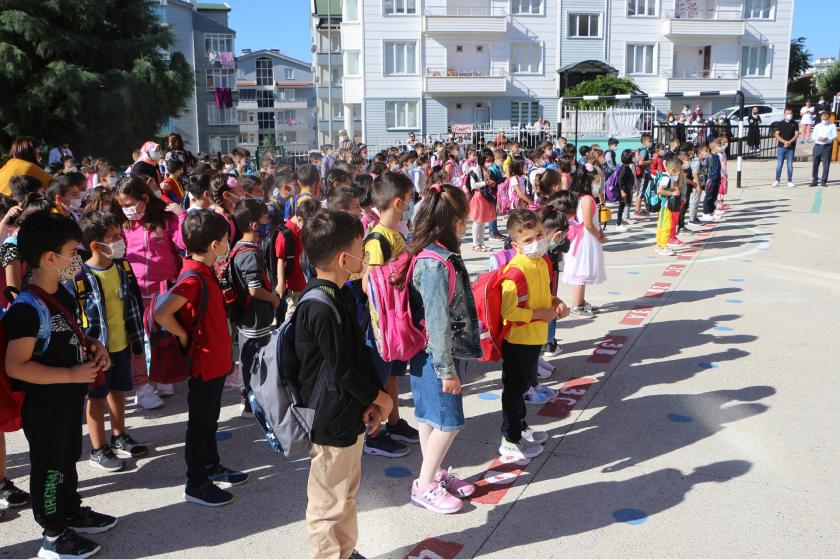


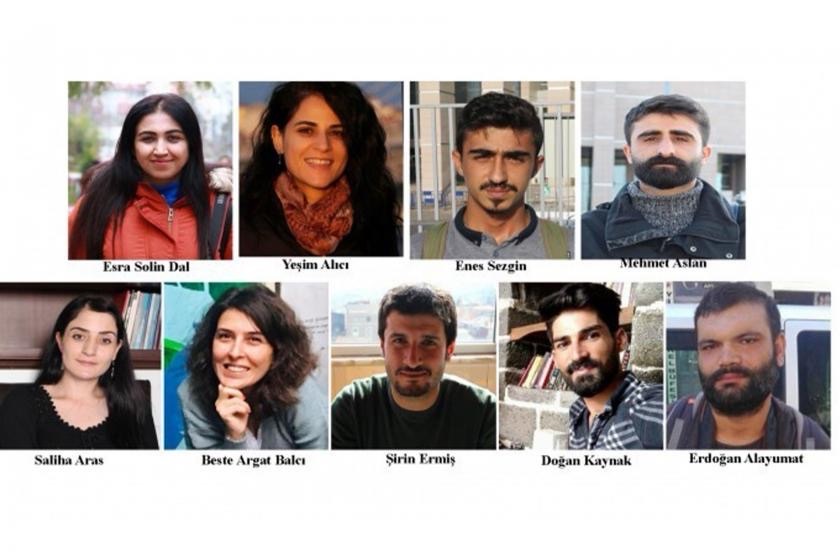






 The deputy mayor of Istanbul’s
The deputy mayor of Istanbul’s 



